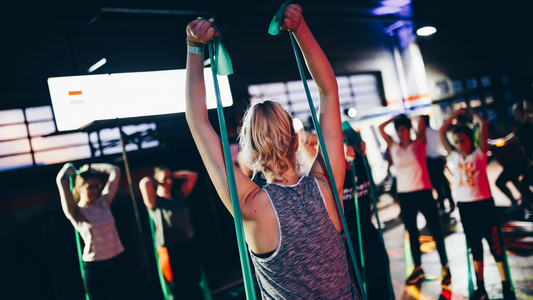

Is Working Out at Night Okay?
Some people may see working out at night as problematic because of misconceptions that it makes sleep worse. In reality, nighttime workouts can help you fall asleep more quickly and improve your sleep quality. Notable exceptions do apply for intense workouts such as high-intensity interval training too soon before your planned bedtime. ZOZOFIT takes a look here.
6 Tips for Working Out at Night
Is it okay to work out at night? Absolutely, as long as your workout is not too intense. Here’s how you can make exercising at nighttime work for you.
1. Keep Your Workout Less Intense
Light or moderate workouts can be great at nighttime. Intense workouts, maybe not so much. Reserve HIIT workouts, sprint-heavy sessions, and hardcore weightlifting for at least two to four hours before bed or at other times of the day. Your body needs adequate time after these intense workouts to cool down and chill to get into "sleep" mode.
If you can exercise only during the night, try yoga or light jogging. Don't skip exercise, though, as the benefits of working out can be incredible.
2. Aim for Consistency
Is it bad to work out at night? It may be if you find yourself constantly too tired to exercise. It may not take much to derail a workout planned for at night. You might be so exhausted by the end of the day or be faced with late work deadlines that you opt out of exercising. In contrast, if you work out in the morning, you ensure it gets done.
If you find yourself making promises about working out at night that you then cannot keep, then another time of the day may be best for you. However, take a look at your schedule. It may help to nail down the factors that keep you from nighttime workouts. Sometimes, they are as simple as expecting too much.
For instance, you might feel like you need an hour-long workout for it to be worthwhile. In these cases, even the slightest obstacle can cause you to get discouraged. It frequently helps to set your expectations lower. If you tell yourself you need to work out for only five minutes, that is at least five minutes of exercise you would not have gotten otherwise, and it often leads to 15, 30, or even 45 minutes of working out.
After a while of exercising for “only five minutes” per night, you may have developed enough of a habit that you don’t even need to think about working out.
Another pro of working out at night is that you probably do not need to rush to get it done. That’s in contrast to morning workouts, which people may be trying to shoehorn in among activities such as waking up, drinking coffee, getting the kids to school, and reaching work on time.
However, if you struggle to work out at night in the first place, you are not alone. Nightly exercise can be difficult for some people to commit to because of how it cuts into their relaxation or leisure time. Watching TV or listening to music while you work out may prove helpful.
3. Identify Concerns and Goals
If you’re thinking about starting nighttime workouts, is it because you want to improve your sleep quality? Or are you afraid the workouts would interfere with already peaceful sleep? Do you think night workouts just aren’t as effective?
Identifying concerns about and goals for working out can help you determine if you’d rather exercise at another time of the day. Working out during the night is incredibly productive for many people because it lets them build a consistent routine. As long as you keep your workouts at a reasonable intensity, they should either aid your ability to sleep well or have a neutral effect.
4. Figure Out the Logistics
Many variables can affect whether working out at night makes sense. Do you envision your nighttime workouts occurring at the gym, perhaps in the form of a fitness class? Would you rather work out at home? Maybe you want to exercise outside via neighborhood walks or jogs? Consider these points:
- Less busy gyms: Gyms are usually considerably less busy at night. That can give you a more productive workout and easier access to equipment. However, some gyms close as early as 8 p.m.
- Fitness classes: Gyms and studios do not offer as many classes (yoga, kickboxing, indoor cycling, etc.) at night. However, through YouTube, virtual reality systems, and online classes, you can still get some type of fitness class at night if you want.
- Safety: Working out at any time of the day can pose safety risks. At nighttime, though, some issues may be more prevalent. For example, inadequate lighting could be a problem on nighttime walks or jogs. You also need to take steps to make yourself more visible to drivers and others. Weather and temperatures could be a factor, too.
A variety of indoor and outdoor routines can help ensure you get a nighttime workout, no matter the conditions.
5. Track Your Progress
Keeping track of metrics such as the ability to fall asleep, sleep quality, your energy levels before and after working out at night, and your progress toward your goals can help you figure out the effectiveness of night workouts. Be sure to note the type of workout you did each time, where, and for how long.
Your stress levels are another metric you may want to keep an eye on. A night workout can be just the thing to shake out the kinks from a long day at a desk or the frustrations from dealing with the commute home.
6. Tweak as Needed
Some people find they do not sleep well after evening workouts. That doesn’t mean you need to rule them out altogether. Some tweaking may be all that is necessary. For example, maybe start with the more strenuous aspects first and end with chiller activities that bring your heart rate down.

![zf-w-[168px] zf-h-[40px]](http://zozofit.com/cdn/shop/t/15/assets/logo-desktop.png?v=117713855448369080381753069598)


